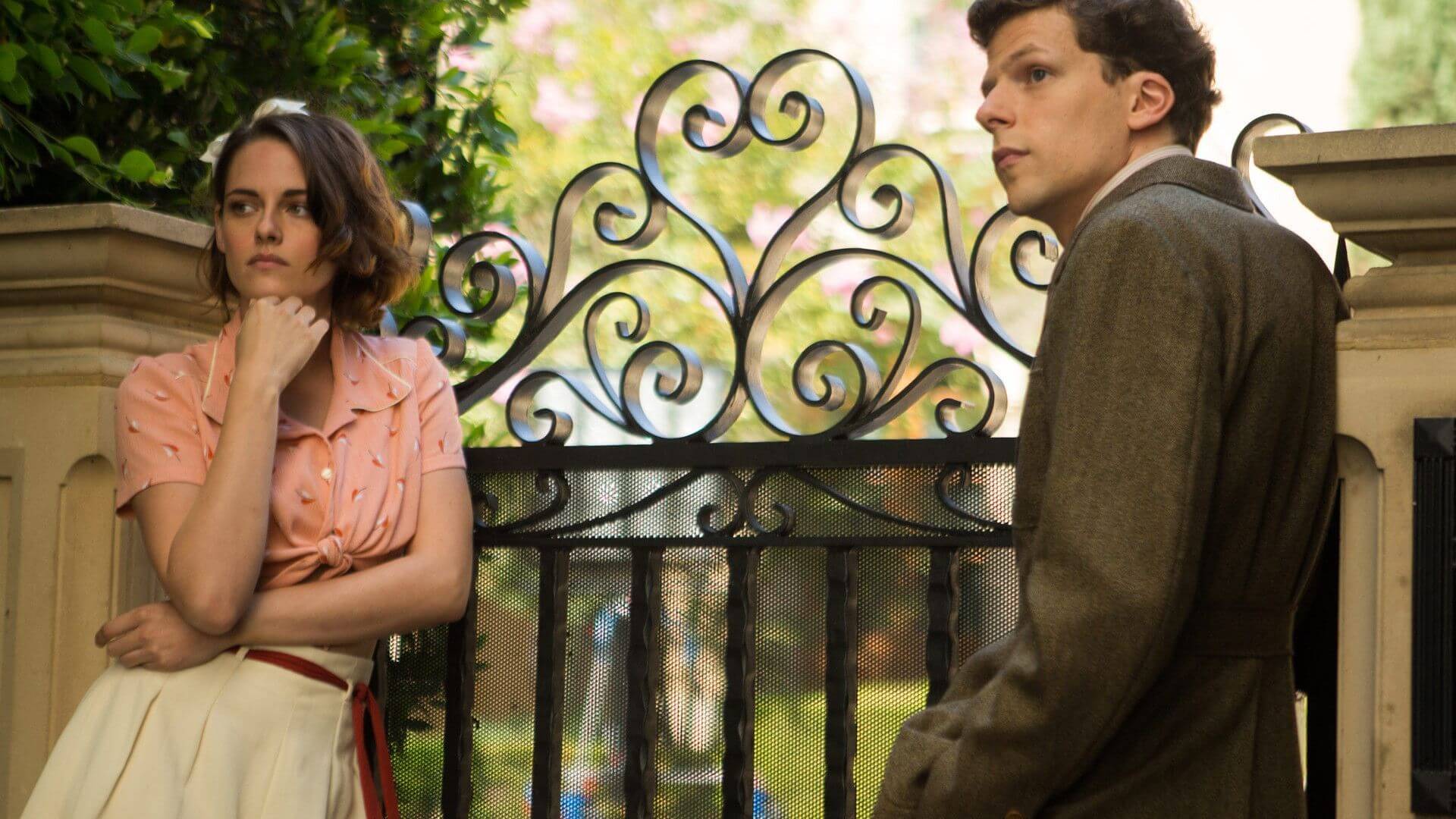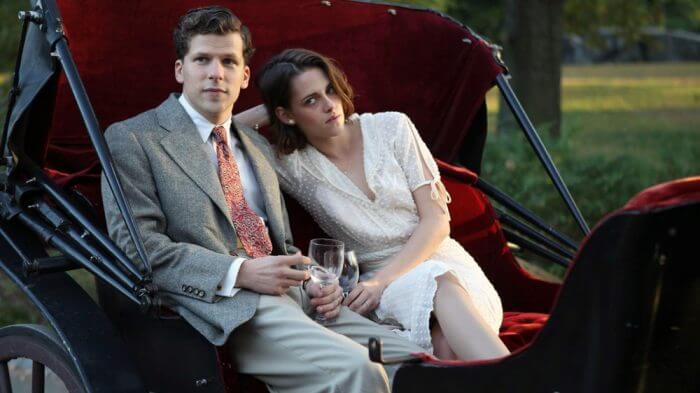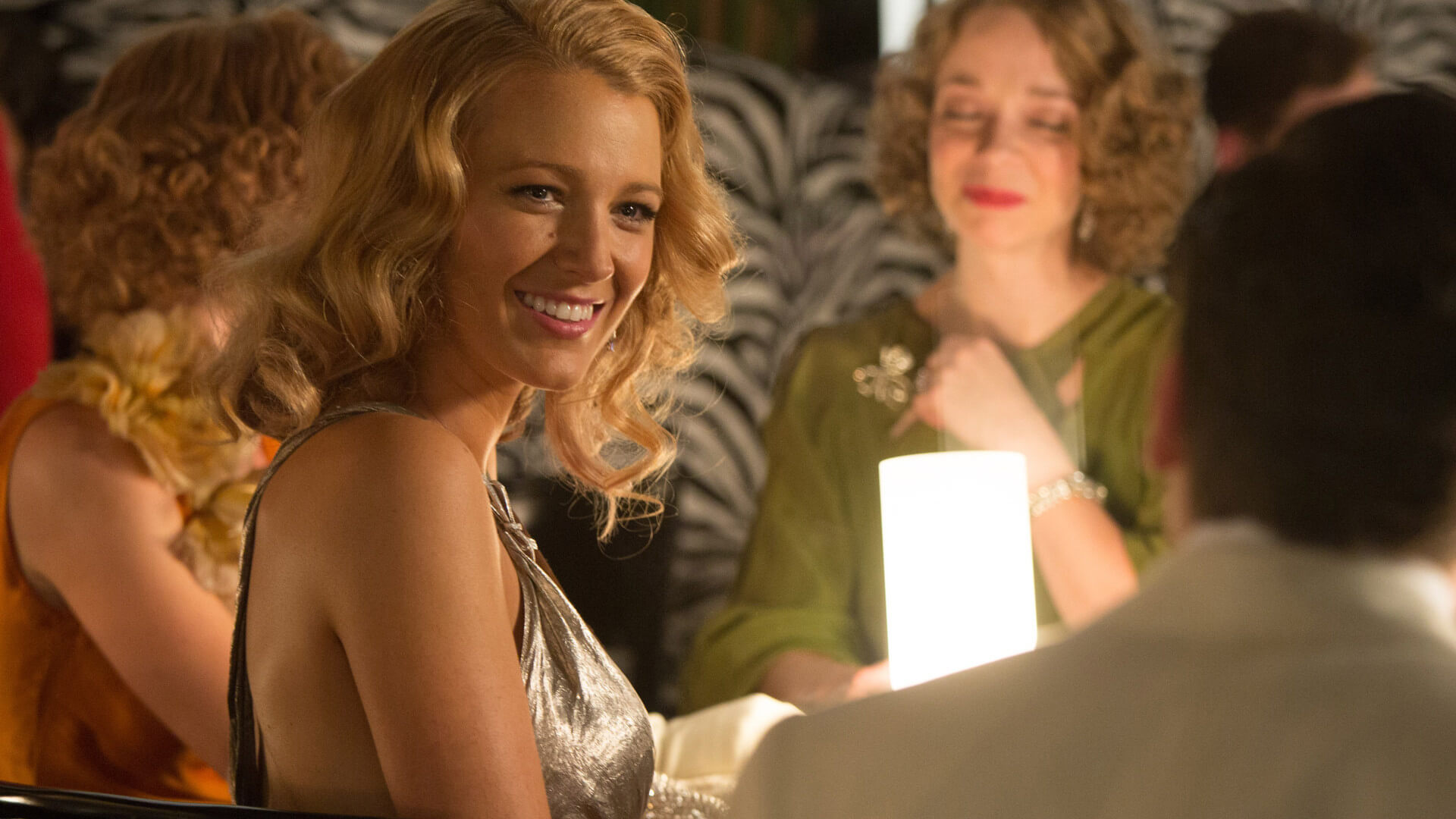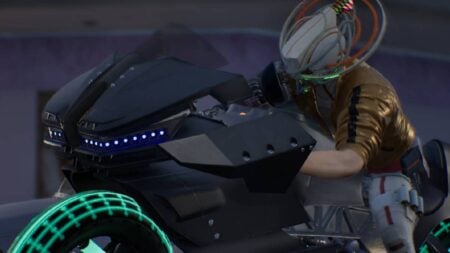Title: Café Society
Release Date: July 15th, 2016
Studio: Amazon Studios
Director: Woody Allen
Release Format: Theatrical
Densely re-created period settings. Intentionally pedantic turns of phrase. Actors intentionally mimicking their director’s signature mannerisms. From frame one, Café Society welcomes its audience to Woody Allen 101. As reliably prompt as any holiday, Allen has churned out yet another of yearly dramedies. Some years they’re fantastic, other years they’re hot messes, and sometimes they’re frustratingly in between. This time, Allen has trained his feelers on Classic 1930s era Hollywood. Perhaps he’s thinking about signing off for good soon, and is looking to make one last grand statement on filmmaking. Or, in the more likely scenario, he’s just looking for a new setting to torture some more of his nebbish characters.
Café Society begins with wide-eyed New Yorker Bobby Dorfman (Jesse Eisenberg) moving to Hollywood. Despite his love for the big apple, he’s grown a bit bored and is looking to jump-start his life. Thankfully, nepotism is as common as heroin in Hollywood. David’s uncle Phil (Steve Carell playing the screens finest uncle Phil since The Fresh Prince) is a high-powered agent. Initially, he assigns David to be an errand boy, meanwhile setting him up with his adorable secretary Vonnie (Kristen Stewart). David is instantly drawn to Vonnie’s cynicism of the Hollywood game and falls for her hard. However, complications are aplenty in a Woody Allen film, and David’s love for Vonnie leads to some unsavory discoveries.
For about half of its runtime, Café Society is some of Allen’s strongest post Midnight in Paris work. This is mostly due to two wonderful leads that do a pitch perfect job of making his dialogue sing. Eisenberg, in particular, is a natural fit for the Allen surrogate. Bobby is one of Allen’s most destructively high strung protagonists in quite some time. In the hands of another actor, he could have been a nightmare to watch. However, it’s so well suited to Eisenberg’s cagey delivery that it comes off as utterly authentic and hilarious. It’s the great performance he needed to recover from his bizarre take on Lex Luthor. He’s also built a very natural chemistry with Stewart over three collaborations, who also does strong work here. She’s a great deal more expressive and three-dimensional than she’s typically allowed to be.
Allen and his crew show impeccable attention to detail in re-creating classic Hollywood. Every inch of the frame, especially in more lavish sequences, feel like they were filmed in a time-travel documentary. It really shows the beauty that mid-budget movies are able to create. All the overpriced Baz Luhrmann CGI New York cityscapes in the world can’t compare to practical production design. This beautiful look ensures that even when the film starts to meander, there’s always something to admire on screen.
The problems with Café Society come in its juggling of the supporting cast. That isn’t to say that the performances are bad, far from it. Most notably, Carell continues his string of rich performances as the sleazy workaholic Phil. However, there are at least three stories going on here, and Allen can’t decide which one is worth telling. As such, the second half devolves into a meandering mash up. Sometimes the film remains focused on Bobby and Vonnie. Other times, it veers into an underdeveloped mobster flick involving Corey Stoll as Bobby’s brother Ben. Meanwhile, just for giggles, Blake Lively is stuck in the middle as another remarkably sweet woman who catches Bobby’s eye. The film contrives excuses for all of these plots to mesh together, even when it seems like one of them seems wrapped up. It’s as if Allen wanted to make a longer film chronicling Bobby’s life, but was told to smash it into an hour and a half.
Thankfully, since the ensemble is so strong, this is by far Allen’s funniest film in quite some time. Allen’s specialty are sequences of squirm-inducing uncomfortably, and he gives us a couple winners here. Particularly, one sequence involving Anna Camp as a shy prostitute does wonders for Bobby’s development while also being side-splitting. If anything, the film needed more sequences like this, especially when the main conflict comes into play. There are some truly icky developments here, some of which even seem to speak to Allen’s controversial history. However, he seems nervous to really dig into those moments. Often times, they’re resolved without showing most of the confrontation, robbing us of a couple of the story’s biggest moments.
Café Society is certainly one of Allen’s more strongly crafted recent efforts. The character writing and performances (especially Eisenberg) really shine under the Hollywood heat. If only the film as a whole held up as well as its strongest moments. Allen finds himself a little lost in his own story. He extenuates parts of the narrative that don’t need to be there and doesn’t quite deliver on what he masterfully sets up. As such, Allen leaves things on a more lukewarm note, as the audience wonders how great this movie could have been if he had made it in his prime.
[review]









